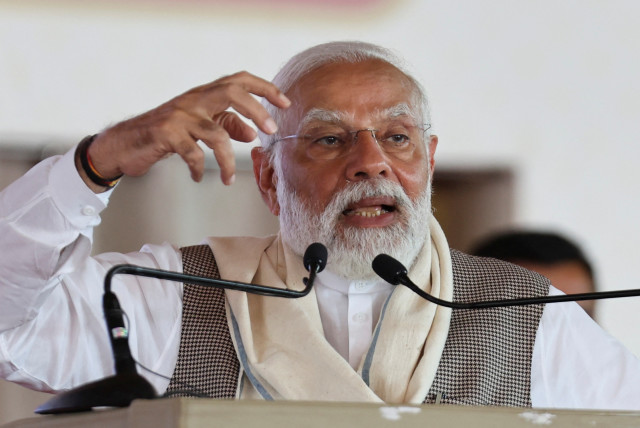Israel must gear up for the evolving political landscape in India - opinion

Despite these potential shifts, the core of India-Israel relations, built on mutual interests and strategic partnerships, is expected to remain strong.
In a landmark political event, Narendra Modi was sworn in for his third consecutive term as prime minister of India on June 9, marking a significant moment in the country’s democratic history.
Modi’s tenure continues, backed by a coalition government under the National Democratic Alliance (NDA), reflecting both continuity and a shift towards broader political alliances – due to his Bharatiya Janata Party’s (BJP) inability to secure an outright majority in the recent general elections.
The swearing-in ceremony at Rashtrapati Bhavan, the official residence of India’s President Droupa Murmu, saw 72 ministers, including key figures, such as Rajnath Singh, Amit Shah, and Subrahmanyam Jaishankar, retaining their portfolios in defense, home, and external affairs respectively. This cabinet features a notable inclusion of 11 leaders from NDA allies, signaling a strategic move toward coalition governance. The cabinet also demonstrates diversity with notable representation from various marginalized communities, including Other Backward Classes (OBCs), Scheduled Castes, Scheduled Tribes, and minority groups.
The composition of Modi’s new government, heavily dependent on political allies, may bring about changes in India’s foreign policy dynamics, particularly regarding its relationship with Israel. Historically, Modi’s Right-leaning government has fostered a strong bilateral relationship with Israel, characterized by robust defense cooperation, technological exchange, and economic ties.
However, the current political scenario may necessitate a nuanced approach. With the BJP lacking an absolute majority, the influence of coalition partners could significantly shape, or at least on certain occasions bear a direct impact on, foreign policy decisions. Some of these allies might prioritize different aspects of international relations based on their national political (vote-bank) agenda or attempt to bring their political agendas to the forefront. This coalition-dependent governance might result in a more balanced approach toward the Israel-Palestine issue, particularly as global recognition of the Palestinian state gains momentum.
Domestically, the Muslim population’s significant role in the recent elections has led to a strengthened representation of the Indian National Congress (INC), the main opposition party. This demographic shift could influence the government’s stance on international issues related to Muslim-majority countries, including Palestine. The need to address the concerns of the Muslim community within India might lead Modi’s government to adopt a more cautious foreign policy.
The BJP’s previous terms aligned clearly with Israeli interests, but the current political landscape could compel Modi to recalibrate his strategies. The increasing global recognition of Palestine and the vocal presence of the Muslim community in India might push the government towards a more diplomatic approach to its Middle Eastern policy.
Status of India-Israel relations
Despite these potential shifts, the core of India-Israel relations, built on mutual interests and strategic partnerships, is expected to remain strong. Defense and technology collaborations are likely to continue, driven by long-standing agreements and shared security concerns.
Modi’s third term as prime minister, marked by a dependent coalition government, presents challenges and opportunities. While the foundational ties with Israel are expected to persist, the nuances of coalition politics and the evolving global and domestic landscapes will shape the future trajectory of India-Israel relations.
The government’s ability to balance these factors will be crucial in maintaining and advancing this important bilateral relationship in a complex and dynamic international political environment.
Hriday Sarma is an India-based lawyer specializing in cross-border trade and investments. Nina Slama is an expert on India’s foreign policy from Reichman University.
Jerusalem Post Store
`; document.getElementById("linkPremium").innerHTML = cont; var divWithLink = document.getElementById("premium-link"); if (divWithLink !== null && divWithLink !== 'undefined') { divWithLink.style.border = "solid 1px #cb0f3e"; divWithLink.style.textAlign = "center"; divWithLink.style.marginBottom = "15px"; divWithLink.style.marginTop = "15px"; divWithLink.style.width = "100%"; divWithLink.style.backgroundColor = "#122952"; divWithLink.style.color = "#ffffff"; divWithLink.style.lineHeight = "1.5"; } } (function (v, i) { });

